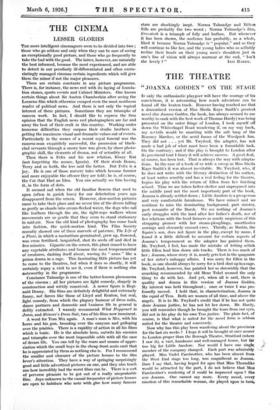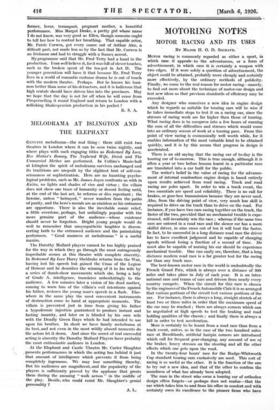THE THEATRE
"JOANNA GODDEN " ON THE STAGE
IF only the enthusiastic playgoer will have the courage of his convictions, it is astounding how much adventure can be found off the beaten track. Rumour having reached me that a dramatized version of Miss Sheila Kaye Smith's greatest novel (for Joanna Godden, the book, has always seemed to me worthy to rank with the best work of Thomas Hardy) was being presented on the outer fringe of London, I took myself off down the Whitechapel Road wondering if, on my way back, my n.-Arils would be smarting with the salt tang of the Romney Marshes, or the acrid fumes of the Woolpack Inn. They did not . . . yet Mr. Twyford, the adapter, has not made a bad job of what must have been a formidable task. On the contrary ; and if this play is brought to London after its provincial tour I fancy it will achieve success. A good deal, of course, has been lost. That is always the way with adapta- tions. In the case of a book of so wide a sweep as Miss Sheila Kaye Smith's it was almost inevitable. Mr. Twyford, who, if he does not write with the literary distinction of his author, at least writes sensibly and has a real feeling for the theatre, begins his play with the return of Ellen from her finishing school. Thus we are taken helter-skelter and unprepared into the middle (and not the most important) part of the book. Joanna is already settled down ; Little Ansdore is a prosperous and very comfortable farmhouse. We have missed and we continue to miss the dominating background, part sinister, part romantic of the Marsh. We see nothing of Joanna's early struggles with the land after her father's death, nor of her relations with the local farmers so sourly suspicious of this strapping pioneer with her steam-ploughings, unorthodox sowings and obscurely crossed ewes. Thirdly, as Martin, the Squire's son, does not figure in the play, except by name, I found it a little difficult to account for certain aspects of Joanna's temperament as the adapter has painted them. Mr. Twyford, I feel, has made the mistake of letting selfish little Ellen lead him down side tracks. There is too much of her ; Joanna, whose story it is, nearly gets lost in the quagmire of her sister's unhappy affairs. I was sorry for Ellen in the book, as one should always be sorry for a bird shut up in a cage. Mr. Twyford, however, has painted her so shrewishly that the smacking recommended by old Mene Tekel seemed the only thing to do with her. And yet, when all is said, there is quality and drama in this version of Joanna Godden. My interest was held throughout ; once or twice I was pro- foundly moved. I hold that, in characterization, Joanna is the equal of Tess. Both are women of all time, and above the angels. It is to Mr. Twyford's credit that if he has not quite
done Joanna justice, he has not let her down. Mr. Hardy, you will remember though he brought the tears from our eyes, did not in his play do his own Tess justice. The plain fact, of course, is that what is suited for the novel form is seldom suited for the theatre and conversely.
Now why has this play been wandering about the provinces for the last six weeks ? I hope it will be brought at once nearer to London proper than the Borough Theatre, Stratford (where I saw it), a vast, handsome and well-managed house, but fat too big for Little Ansdore. Nor would I have one single member of the company changed. Each part was admirably played. Miss Violet Farebrother, who has been absent from the West End stage too long, was magnificent as Joanna.
Dare I say that, having hoped for ages that Miss Thorndike would be attracted by the part, I do not believe that Miss Farebrother's rendering of it could be improved upon ? She was Joanna. One cannot say more. Every mood, every emotion of this remarkable woman, she played upon in turn,
farmer, lover, termagant, pregnant mother, a beautiful performance. Miss Margot Drake, a pretty girl whose name I do not know, was very good as Ellen, though someone ought to tell her how to control her breathing. That capable actor, Mr. Patric Curwen, got every ounce out of Arthur Alce, a difficult part, not made less so by the fact that Mr. Curwen is an Irishman and had to struggle with a Sussex accent.
My programme said that Mr. Fred Terry had a hand in the production. I can well believe it, for it was full of clever touches, such as the broken spout of the tea-pot in Act II. The younger generation will have it that because Mr. Fred Terry lives in a world of romantic costume drama he is out of touch with the modern theatre. Perhaps. But he knows his busi- ness better than some of his detractors, and it is ludicrous that high rentals should have driven him into the provinces. May we hope that the day is not far off when he will cease from Pimpernelling it round England and return to London with a rollicking Shakespearian production in his pocket ?
E. S. A.







































































 Previous page
Previous page